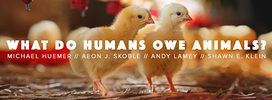Mike Huemer and Andy Lamey have now both written response essays which include objections to my contributions to the discussion. In the spirit of continuing the discussion, I’d like to address those. Huemer notes in several places that “Skoble may actually be in almost complete agreement with me,” but since I continue to think meat-eating is not a moral wrong, I suspect Huemer is mistaken. The confusion probably arises because I tried to set off a space wherein killing animals for eating is morally legitimate, but cruelty for fun is not. Huemer’s inference is then that if I concede that cruelty is bad, then since the vast majority of animals killed for food are treated cruelly, I ought to be opposed to meat eating. He suggests an analogy wherein 99% of homicides are wrong but 1% are justified—we should not use the 1% as a justification for overlooking the wrong 99%. But this is disanalogous. The self-defensive killings are completely different from the murders. But it’s always legitimate to kill animals to eat them (well, not always—you may not kill one that belongs to someone else), even if some methods of doing the killing are preferable to others. Ceteris paribus, it would be better if we could slaughter food animals less painfully rather than more painfully, but what makes the ceteris paribus? If it’s a system in which only rich white people can have meat, then I’m going to say no. All humans have the same right to food. Factory farming makes it possible for lower-income people to have access to something that otherwise would only be available to rich people. If free-range chickens cost a consumer an extra fifty dollars a year versus “factory” chickens, that means lower-income people may not be able to eat chicken. The suffering of chickens cannot outweigh the suffering of people. Objections to this take the form of “you’re a speciesist!” but if you think some amount of chicken suffering legitimates some amount of human suffering, that’s Benthamism. Huemer insists he’s not a utilitarian, but it seems to me that it’s only utilitarianism that could lead one to think that it’s right to cause X amount of human suffering to avoid Y amount of chicken suffering.
Huemer also reiterates the charge that I commit the so-called “naturalistic fallacy”—since it’s in our nature to be omnivorous, it’s therefore good to be omnivorous. He thinks this is absurd because some have argued that rape and war are part of nature as well, and we don’t think those are good. I do not think that that’s the right way to think about our nature, or what might be morally relevant to an assessment of our nature. For one thing, I deny that “occurs in nature” is relevant to thinking about the requirements of our nature—obviously (?) everything that happens is something that occurs in nature. If I ate a bag of sand, that would be “occurring in nature,” yet it’s clear that this is actually contrary to the requirements of human nature. It “occurs in nature” that a person can forego sleep for 36 hours, yet this is contrary to our nature. Our nature implies certain oughts. That’s why I referred to the “naturalistic fallacy” as “so-called”—it’s not a settled matter that there is such a fallacy.[1] I would deny that rape and war are conducive to human well-being. These are personal or political choices that may well be based on a mistaken conception of what our nature requires. But omnivory is not based on a mistaken conception of what our nature requires. We are evolved to be omnivorous, which means our nutritional needs are most efficiently (and for many, most pleasurably[2]) fulfilled by omnivory. If you don’t like fish, don’t eat fish, though it would be wise to find other sources of protein and omega-3 fatty acids. If you do like fish, but think it’s immoral to eat them, that’s what I am pushing back against. I do not see an argument to the effect that it’s immoral to eat a fish. These arguments invariably devolve into Benthamite utilitarianism.
Huemer says that his principle is not utilitarian, but simply: “It is wrong to cause great pain and suffering to others for the sake of small benefits to oneself.” But there’s a sleight-of-hand there: “to others.” Other what? If it means “other people,” then of course I totally agree. If it’s supposed to mean any other living thing, then it’s starting to look Benthamic.
Lamey argues that we should insist upon humane methods of slaughter. I agree this is preferable, again ceteris paribus. Lamey notes, surely correctly, that “What keeps factory farming in existence is not popular support, but the regulatory capture of legislatures by powerful industry interests.” This is the problem with government licensure in general, as regular visitors to this site will have read before. So if there’s a philosophical argument in favor of humane slaughter and general popular support for cruelty reduction, but this is blocked because of regulatory capture, that’s all the more reason to open the markets. As usual, the state forces us into moral compromise. So there’s common ground on that, certainly. But I continue to disagree that eating meat is per se immoral. An imperative to avoiding unnecessary cruelty as much as possible does not entail forgoing meat any more than it entails forgoing driving or building houses.
Notes
[1] See, e.g., Philippa Foot, Natural Goodness (Oxford University Press, 2001) or Douglas Den Uyl and Douglas Rasmussen, The Perfectionist Turn (Edinburgh University Press, 2016).
[2] And that’s not irrelevant: see, e.g., Loren Lomasky, “Is It Wrong to Eat Animals?” Social Philosophy and Policy 30, no. 1-2, January 2013, pp. 177-200.

